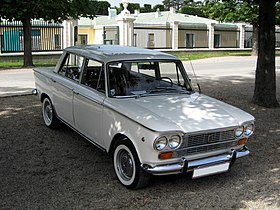Fiat 1300
| Fiat 1300 Fiat 1500 |
|
|---|---|

Fiat 1500 C
|
|
| Overview | |
| Manufacturer | Fiat |
| Also called | Zastava 1300 |
| Production | 1961–1967 |
| Designer | Mario Boano at Centro Stile Fiat |
| Body and chassis | |
| Class | Large family car (D) |
| Body style | 4-door saloon 5-door station wagon 2-door cabriolet 2-door coupé |
| Layout | FR layout |
| Related |
SEAT 1500 Fiat 125 Polski Fiat 125p Zastava 1300 |
| Powertrain | |
| Engine | 1295 cc OHV I4 1481 cc OHV I4 |
| Transmission | 4-speed manual all-synchromesh |
| Dimensions | |
| Wheelbase | 2,425 mm (95.5 in) 2,505 mm (98.6 in) (1500 C) |
| Length | 4,030 mm (158.7 in) 4,130 mm (163 in) (1500 C) |
| Width | 1,545 mm (60.8 in) |
| Height | 1,365 mm (53.7 in) |
| Kerb weight | 960 kg (2,116 lb) |
| Chronology | |
| Predecessor | Fiat 1400, Fiat 1200 cabriolet |
| Successor |
Fiat 124 (1300) Fiat 125 (1500) Fiat 124 Sport Spider (Cabriolet) |
The Fiat 1300 and Fiat 1500 are automobiles which were manufactured by the Italian automaker Fiat from 1961 to 1967. They replaced the Fiat 1400 and Fiat 1200 coupé, spyder and cabriolet. The 1300 and 1500 were essentially identical except for their engine displacement, as indicated by their model names. They were available as a saloon and station wagon, and as convertible and coupé models which shared little mechanically with the other body styles except the 1500 engine.
The car's 75 hp engine combined with its lightweight construction was unusual for the time, especially when considering the price. Front wheels were equipped with disc brakes with four-pot calipers while rear brakes were alloy drums.
The 1300/1500 and their derivatives were also assembled by Yugoslavia's Zastava and Fiat's German subsidiary, Neckar Automobil AG, as well as in South Africa. The floorpan of the 1500 C was used as a basis for the 1500s replacement, the Fiat 125, while another model, the Polski Fiat 125p, made by the Polish FSO, was created by mating the body of 125 and mechanicals (engines, gearbox, transmission, suspension) of 1300/1500. In the Italian range, the 1300 was replaced by the Fiat 124 in 1966, and the 1500 by the Fiat 125 a year later.
In total, 1,900,000 units were produced worldwide.
The 1300/1500 were conventional cars, with longitudinally, front-mounted engines powering the rear axle via a four-speed manual transmission with a column gearchange. The engines employed were two versions of the same design, differing mainly in bore:
...
Wikipedia
